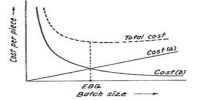A budget generally refers to a department’s or a company’s probable revenues, costs, or expenses. A standard generally refers to a projected amount per unit of product, per unit of input, or per unit of output.
Although budget and standard casting both are based on some common principles; both are pre-determined, a comparison will be made with the actual costs and both systems need a revision of the standards or the budget, these differences which are as follows:
Budget
- Definition: Budgetary control deals with the operation of a department or the business as a whole in terms of revenue and expenditure.
- Control: Budget covers as a whole in terms of revenue and expenditures such as purchases, sales, production, finance etc.
- Applicable: Budgetary control is applicable to utmost all business organizations.
- Time: Budgetary control is concerned with a specific period and is based on the totals of amounts.
- Base: Budgetary control is not based on a standard costing system.
Example: A manufacturer will have budgets for its manufacturing or factory overhead departments. Let’s assume that the budgeted manufacturing overhead for the upcoming year is expected to be $ 1,000,000 in order to produce the expected 100,000 identical units of product.
Standards
- Definition: Standard costing is a system of costing which makes a comparison between standard costs of each, product or service with its actual cost.
- Control: Standard costing is related to a product and its cost only.
- Applicable: Standard costing is applicable to manufacturing concerns producing standard products and services.
- Time: Standard costing is concerned with the standard costs, which are worked out generally per unit of production.
- Base: Standard costing cannot exist in the absence of a budgetary control system.
Example: The standard cost of manufacturing overhead per unit of product is $ 10 ($ 1,000,000 divided by 100,000 units).















